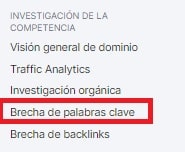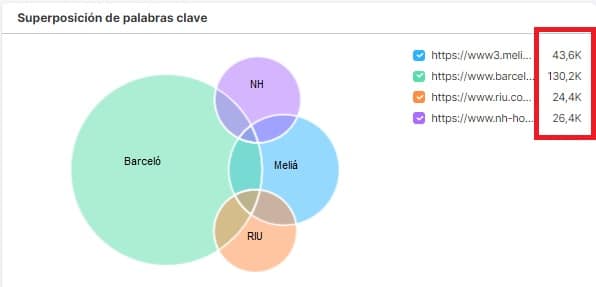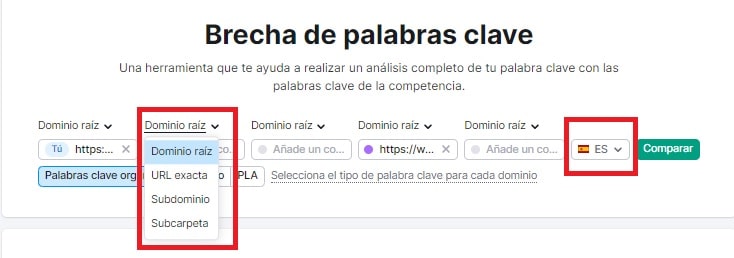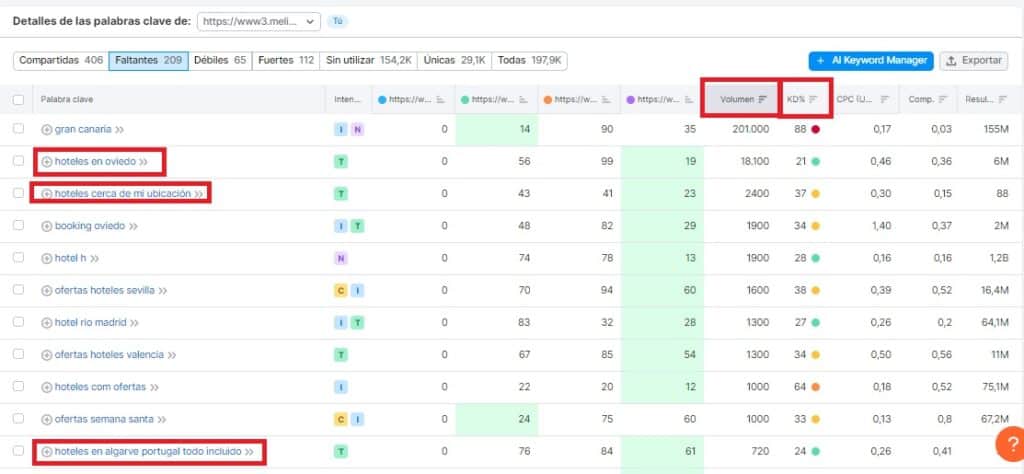Studying the SEO competence is an obligation if we want to prevent our competitors gaining ground on Google. Also if we want to be inspired and find new strategies that we might not even have considered.
Sometimes it can even work to feed our egos. It is never good to rest on your laurels, but checking that you are doing well and your competitors are not can give you a bit of a boost. extra motivation which never hurts.
In our article on SEO or SEMWe have already counted that one strategy 100% paid can also work. It is possible that our competitor has discarded the organic channel and is investing only in a Google Ads campaign or social ads.
In that case, it may be equally interesting to study which keywords you are bidding for. We can compete with them from the organic and steal market share with a clear advantage. If we manage to position ourselves in the top positions, we will always be there, while the competitor will only appear when it wins its bid against the rest of the advertisers.
That is, if we both appear at the same time, ads tend to have a higher CTRby ranking above the organic results.
But, before we start with the form of analysing SEO competitionLet's look at what we mean by that. It is not a trivial matter, depending on who we consider our competition, the strategy may vary completely.
What is our organic competence?

There are two options for defining who is our SEO competence. First of all, we can consider that our organic competence are our business competitors. That is, those other companies that are in the same business as us and for which we compete for the same clientele.
For example, if we have to positioning the website In the case of a hotel, our competition would be, firstly, the other hotels and tourist accommodation in our area and, secondly, other hotels and accommodation in other similar tourist destinations.
If we run the website of a cinema chain, our direct competition would be other cinema chains, but also television itself or streaming services.
However, it is not always (in fact, seldom) our business competitors are our organic competitors. By means of different SEO tools as SEMrush o Ahrefs (or manually) we can check which domains are competing for our same keywords.
For this second definition to make sense, we need to be working our SEO content strategy for a long time. Otherwise, our list of organic competitors may not have much relevance and the keywords we have in common may not be significant.
I will go into more detail below on what is involved in choosing one or the other.
Opting for real-world physical competitors

In this case, the first thing we need to be clear about is who are our main competitors. In any case digital strategyalways have to define and delimit. We may come up with a list of thirty or forty major competitors, but we should focus on four or five.
If in doubt about which ones to choose, what I would do is to check which of these physical competitors are the strongest in SEO or, failing that, in SEM.
If we find physical competitors which are also SEO competence we have a win win. Without a doubt, they are our target.
Our goal here is to weaken the company's online presence. To do this, we must consider the conversion funnel. They may have positioned more general topics that seem to have little relation to the service or product that we sell in common, but they can be good keywords for the first one. acquisition phase.
We can also see content related to services and positioned products that we do not sell. In the first instance, I would not prioritise competing here. However, I have on occasion encountered clients who want to weaken their competition also by making them reduce their advantage for these other non-common services.
In the end it is a strategic decision. For me, it is always I would prioritise the early stages of the conversion funnel to attract traffic and services that are in commonThe most important thing is that it will be what generates the most sales and makes the cost-effective SEO strategy.
Even if we opt for the next option, that of competing with real organic competitors, we should always keep an eye on the business competitors. We never know when they might start working their digital strategy and you have to be vigilant just in case.
Opting for SEO competitors

This option would be my first choice. If we are working on the SEOLet's see who is working on the same terms as us. In fact, we may find competitors we didn't even know existed.
We will see in our tool which pages are most closely related to ours. What these tools measure is not the keywords used per se, but the keywords that appear in the SERPSi.e. in the Google results.
If a page is very similar to ours but has virtually no indexed content, it will not appear.
This is good for us, because then we will see only which sites are competing with us for users in real time. We will also be able to see what keywords they use and we don't, to find new positioning opportunities.
This type of competition is our real competition in organic terms. If they have nothing to do with the actual competitors, it can mean two things.
- Competitors are not doing their job well.
- Our keyword strategy is not focused where it should be.
In case we find ourselves in option two, we would have to look at the point of business competition and completely change our strategy, starting with a new keyword research.
How to study SEO competition?

For the following steps I will choose as a reference SEMrushbut there are also others payment instruments with similar functionalities. At the moment, I don't know of any free one that allows you to carry out this study in a complete way.
With Ubbersuggest you can do a basic keyword study to see what competitors each keyword has, although you can't generate the competitors directly by entering your domain like with the payment tools.
Or, create your own list of competitors you want to compare and see what happens. This option, not including ourselves, is a very good idea to start our organic strategy if we have not worked on SEO so far.

Let's do a practical exercise by checking four major Spanish hotel chains: Meliá, Barceló, Riu and NH. We start by going to the Competition research from SEMrush and there we select keyword gap.
However, I recommend that you investigate all the options in this section in depth.
Check the keyword gap

The next step is to introduce the dominance of the four competitorsfive if we want to be included. Here it is important to check that it is selected organic keywords (as I mentioned before, we can also compare paid keywords) and the root domainThere may be cases where you are only interested in a sub-folder or a sub-domain.
For example, if our business is national and we compare with a large multinational, we will only be interested in the subdomain they use for Spain.

Likewise, here we can compare by country. As we are in Spain, we have selected Spain. To make it easier we have the root domain of all and Spain, although as we are multinational companies we could also do it with its Spanish subdomain.
Once we have all four, we click on compare. These are the results:
To begin with, we can see that Barceló is five times the performance of RIU or NH and three times that of Meliá. Curiously, if we look at turnover, number of rooms or number of establishments, Barceló does not occupy the first position in any of them.
That is why I commented earlier that the main organic competitors do not have to compete with the main competitors at business level.

Taking a second look we see what keywords they share the four competitors, the keywords that are missing from the one we have placed first (if we enter ourselves we have to place ourselves first) or the keywords that are used by everyone else but us.
In this case we have put in the first place MeliáSo we see that there are 406 keywords shared by the four chains and 206 shared by the other 3 that Meliá does not have. If I were Meliá, I would start by looking at those 206, since if they share all of them, they all seem relevant. Eliminating competitors one by one, we can also see that what keywords they have two others and not us, for example.
If we want to see all those used by our competitors and not by us, we can click on "Unused".
We can play around and look at variables by comparing different competitors and finding what we are most interested in.
Volume, Keyword difficulty and other variables

The time has come to look at the different keywords available. Here I always recommend paying special attention to volume, but also to the keyword difficulty.
In this example, we are looking at the missing keywords that all our competitors have and what is their exact position in the SERP at the time. Of course, here it is also important to know the business.
We can see that we are not positioned in Gran Canaria but also that positioning this keyword is practically impossible. We can see that keywords such as hotels Oviedo or hotels in Algarve Portugal all inclusive are easier to position.
Meliá has a hotel in Oviedothe Meliá de la Reconquista. On the other hand, for the time being, it does not yet have a hotel in the Algarve. So what we would be interested in positioning at first glance is "hotels Oviedo". For this we can optimise texts but also to work on the backlinksfor example, taking care not to fall into the Black Hat SEO.
The keyword "hotels near my location" suggests that competitors are using a search engine with geolocation, so it is also interesting to take these things into account and include it if necessary.
Little by little, we are searching for and selecting those we are interested in. positioning at business level and that it is feasible. Especially important are those results that competitors have in the top ten positions, because otherwise they will practically not bring organic traffic.
It is a long process, but it is also a beautiful one, which helps us to know more about what positions our company in the market. SEO competence and gives us ideas to improve our results.





